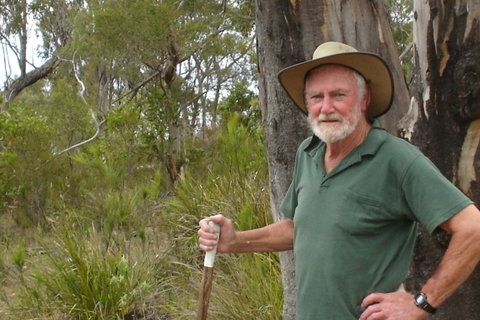Allan Cox
Allan Cox (PhD '69), one of the Faculty's very first PhD graduates, reflects on this time with KSR and where his career has taken him over the past 50 years.

A simple coin toss determined one of the most important moments of Allan Cox's life-and one that was to put the young Australian into the Faculty's history books as its first doctoral degree graduate. He and fellow Australian, Peter Lindsay, were the first PhD students to enter the Faculty's inaugural doctoral program in 1967. Close friends throughout both their master's and doctoral programs, they also completed their theses together.
Their theses' defence, however, presented a dilemma as they both wanted to complete on the same day.
"When our final oral examination arrived in August 1969 with our external examiner Earl Zeigler, Max Howell (supervisor), Maury Van Vliet, Steve Mendryk, Richard Alderman and Robert Hett (History Department), Peter and I tossed a coin to decide our order of appearance," says Allan. "Peter won the toss and decided to have me go first. After an hour's drilling, Professor Howell led me out the door to congratulate me as his first PhD graduate. By the strength of his grin I thought that he was more pleased than I was-but then I was still shaking at the knees."
Born and raised in Depression-era Australia, Cox understood hardship all too well. With his father being unemployed from 1930 to 1936, he worked hard to educate himself. He attended the Sydney Teachers' College, graduating with a Diploma of Physical Education. Coincidentally, he graduated just a few years behind the same Max Howell who was later to become a professor in the Faculty of Physical Education and Recreation (now known as the Faculty of Kinesiology, Sport, and Recreation) and Cox's mentor during his doctoral program.
Before all this, Cox taught physical education for 10 years and completed a BA by distance education. While lecturing at Armidale Teachers' College, he decided to advance his education further. He applied to universities around the world, but it seemed his and Max's fates were intertwined, with Max warmly welcoming his former countryman to study at the University of Alberta.
For Cox, married to wife, Judy, and with four children, studying for a PhD wasn't easy.
"Six courses and a dissertation meant that days (and nights) were full on," remembers Cox. "Up at 5 a.m. to take the kids to swim training, and work as an assistant coach; then off to Uni at 8 a.m. and not home again until 10 or 11p.m. meant a couple of years with minimum sleep. However, I made sure that most weekends were free for family life."
"We all enjoyed the delights of Alberta and the Rockies to the full: lots of camping, fishing, walking, tobogganing, and social interaction with such friendly Canadian people. Our kids have never forgotten their Canadian experiences. It took only two or three years for their accents to mellow and for them to understand what their Aussie mates were saying!"
The family returned to Australia in 1969 where Cox became senior lecturer and head of the department of Physical Education at the Armidale College of Advanced Education; later he became a principal lecturer and dean of Teacher Education, leading a staff of about 80 lecturers in Bachelor of Education and Master of Educational Administration programs.
Cox's love of sport led him to coach swimming as well, and, with the help of Judy and parent coaches they'd trained, built the local swim club to over 170 members of children and youth aged five to 18.
"Over eight years we were able to teach hundreds of children and adults to swim. Many of our swimmers achieved considerable competitive success up to the national level."
While Cox loved swimming, track and field sports were his passion. From helping elementary school teachers improve their training and administration techniques, Cox went on to form a track and field club that quickly saw hundreds of youngsters competing successfully at local, state and national levels.
Track and field became a passion in the Cox household too.
"My daughter Linda was never defeated as sub-junior and junior over 1500m nationally and overseas."
His wife, Judy, excelled too, holding world records in 1500m, 5000m and 10,000m at the Master's level and winning the world marathon championship in the 50 to 54 age group in Japan in 1982. No slouch himself, Cox competed vigorously too.
"I held the national pentathlon championship several times until I was 70 when my knees decided to object,"
In 2000, Allan and Judy's considerable contributions to sport were recognized by the country when they were awarded the Australian Sports Medal.
Cox retired from the education system in 1987, when he realized his next promotion-probably to assistant Vice Chancellor-would hold few opportunities for interaction with students-something he'd treasured as an educator throughout his long career.
Allan and Judy's children have adopted their father's passion for learning. Peter is Regional CEO, High Performance Education N.S.W; Dianne (PhD) is Dean of Social Sciences at La Tobe University; Helen is a high school senior physical education teacher; and Linda is Principal of an Elementary School.
Since 1987, he says, "My retirement has been full-on, with Masters' Track and Field; deep sea fishing regularly with Judy in our boat; frequent camping and bushwalking throughout Australia; growing nearly all of our own vegetables and enjoying the development of our 11 grandchildren."
Asked about the most important lessons in life he's learned, Cox says, "Learn in order to pass on selected knowledge to as many others as possible. My passion for nature and care for the environment produces a bias which has always influenced my lifestyle and teaching. I have always tried to practice what I preach."
Allan at 88 and Judy at 87 are still exercising regularly, live in Hobart, Australia and welcome Alumni to get in touch via judycox32@gmail.com.